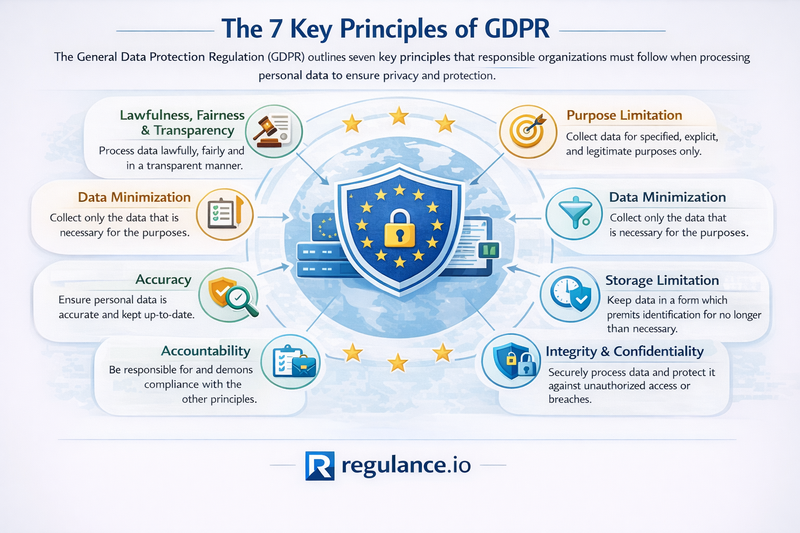Why the 7 GDPR Principles Matter and How They Influence Your Business Operations


Introduction
The General Data Protection Regulation (GDPR) officially came into effect on May 25, 2018, its debut played a major role in transforming the way organizations across the world approach data privacy and security. GDPR is considered as one of the most substantial regulations in present times. Its main purpose is to give individuals more control over their personal information and to hold businesses accountable for how that data is collected, stored, and used.
Nowadays, companies depend heavily on data-driven insights hence the need of protecting sensitive information. Personal data is often generated with a click, purchase, or online interaction, however, with the rising menace of cyber threats and data breaches, customers are more concerned about how their information is being protected. On the other hand, businesses that fail to meet these expectations expose themselves to financial penalties, loss of trust and long-term damage to reputation.
This is where GDPR compliance protects businesses from these data breaches and acts more than a legal requirement. GDPR embeds privacy and security into daily operations thus enabling organizations to reduce risk and build stronger relationships with their customers.
GDPR is directed by seven core principles, which act as the blueprint for responsible and transparent data management. Adhering to these principles comes with real benefits such as customer trust, improving operational efficiency to strengthen your brand’s credibility in the marketplace and ensuring your business is always compliant.
The 7 Key Principles of GDPR
The strong foundation of GDPR compliance lies in seven key principles that guide how organizations should collect, process, and manage personal data. These principles best practices that protect individuals’ privacy while enabling businesses to build transparency and trust.

Lawfulness, Fairness, and Transparency
This principle requires that all personal data be handled legally, fairly, and transparently. This means businesses must have a valid legal basis for processing data, such as consent or contractual necessity. Fairness ensures that individuals are not misled or exploited, on the other hand transparency requires clear communication about how and why data is being collected. This openness builds trust and strengthens the credibility of your GDPR compliance strategy.
Purpose Limitation
This means that data can only be collected for specific, explicit, and legitimate purposes. Once collected, it should not be used in ways that do not match the original purpose. For example, if a customer provides their email to receive a receipt, it cannot later be used for unrelated marketing unless they’ve given consent. Purpose limitation prevents misuse and strengthens respect for individual rights.
Data Minimization
This principle emphasizes collecting only what you truly need. Organizations should avoid gathering excessive information that has no direct relevance to their service. By practicing data minimization, organizations reduce storage costs, limit exposure to security risks, and make compliance management easier. It’s an efficient, and safer way to handle personal information.
Accuracy
It is important to ensure that personal data is accurate and kept up to date. Holding incorrect or outdated information can harm individuals and create compliance risks. Under GDPR compliance, businesses are responsible for taking reasonable steps to correct or erase inaccuracies promptly. Accurate data ensures fairness and improves the quality of customer service and business decision-making.
Storage Limitation
Organizations should ensure that data is not kept longer than the required amount of time. Once the original purpose has been achieved, organizations must securely delete or anonymize personal data. Storing data indefinitely increases the risk of breaches and non-compliance. A clear data retention policy ensures businesses strike the right balance between operational needs and privacy protection.
Integrity and Confidentiality (Security)
Security is a foundation of GDPR compliance. Organizations are tasked to protect personal data against unauthorized access, loss, damage, or misuse by implementing both technical and organizational safeguards. This includes encryption, secure networks, employee training, and access controls. Strong security measures assist in meeting GDPR requirements and additionally shield businesses from reputational and financial damage caused by data breaches.
Accountability
The final principle emphasizes that organizations must take full responsibility for how they process personal data. This entails more than following the rules, hence businesses are required to be able to demonstrate compliance through policies, records, audits, and evidence of good practices. Accountability nurtures a culture of responsibility and ensures GDPR compliance becomes an integral part of day-to-day operations.
Benefits of Being GDPR Compliant
Enhanced Customer Trust
As the technology continues to evolve, it comes with constant data breaches and privacy scandals and this means trust is important. When customers discover that you take their privacy seriously, with clear policies, transparent practices, and robust security; they're more likely to do business with you. Trust needs more time and a lot of work, but respecting data privacy is one of the fastest ways to earn it.
People are increasingly privacy-conscious. Make an effort of showing them you're on their side, and they'll reward you with their loyalty.
Competitive Advantage
If you've invested in proper GDPR compliance, you're already ahead of competitors who treat it as an afterthought. Privacy-conscious customers actively seek out companies that respect their data. Being able to say "we're fully GDPR compliant" can be the deciding factor in landing contracts, especially with enterprise clients or EU-based partners.
Reduced Risk of Penalties
GDPR fines can reach up to €20 million or 4% of global annual turnover, whichever is higher. That's a very huge amount that can damage your business. By maintaining strong compliance, you're protecting your organization from devastating penalties. However, non-compliance can trigger lawsuits, regulatory investigations, and mandated audits that drain resources and management attention.
Improved Data Management
GDPR compliance encourages you to get organized. Suddenly, you know exactly what data you have, where it lives, who can access it, and why you're keeping it. This clarity eliminates data silos, reduces redundancy, and makes your operations more efficient. Many businesses discover that the data hygiene required for GDPR actually improves their analytics, customer insights, and decision-making.
Clean data is valuable data.
Stronger Security Posture
The security measures required for GDPR compliance; encryption, access controls, regular audits, incident response plans protect you from more than just regulatory fines. They shield you from cyberattacks, ransomware, and data breaches that can cripple businesses. The average cost of a data breach is millions of dollars when you factor in notification costs, legal fees, remediation, and lost business. GDPR compliance helps prevent those disasters.
Long-Term Sustainability
GDPR data protection laws are tightening worldwide. California has CCPA, Brazil has LGPD, and dozens of other jurisdictions are following suit. By building a strong privacy foundation now, you're future-proofing your business. You're not just checking boxes for today's regulations; you're establishing practices that will serve you for years to come as the privacy landscape evolves.
Best Practices for Staying Compliant
Conduct Regular Audits and Risk Assessments
To ensure GDPR compliance, you are required to set a schedule either quarterly or annually to review your data practices. What data are you collecting? Is it still necessary? Are your security measures up to date? Conduct Data Protection Impact Assessments (DPIAs) for any new processing activities that might pose high risks to individuals' rights. Regular audits help you identify problems before they become violations.
Invest in Employee Training and Awareness
Your weak security systems mean nothing if an employee clicks a phishing link or shares login credentials. Organizations that handle personal data need to understand GDPR principles, recognize risks, and know how to respond to data requests or breaches. Make privacy training part of onboarding and provide refresher courses regularly. Culture matters when your team understands why privacy matters, not just the rules, compliance becomes second nature.
Leverage Compliance Automation Tools
Technology can shoulder much of the compliance burden. Use tools for:
- Consent management – Track and document user permissions
- Data mapping – Know where all your data lives
- Automated deletion – Enforce retention policies without manual effort
- Incident response – Streamline breach reporting and notifications
- Access request management – Handle Subject Access Requests (SARs) efficiently
These tools save time and they reduce human error and provide the documentation trail you need for accountability.
Establish Clear Data Retention and Breach Response Policies
Organizations should make sure they document everything. They should create a data retention schedule that specifies how long different categories of data should be kept and when they should be deleted. Develop a comprehensive breach response plan that outlines:
- How to detect and contain a breach
- Who to notify and when (you have 72 hours to report certain breaches to supervisory authorities)
- How to communicate with affected individuals
- Post-incident review procedures
Practice your breach response with tabletop exercises. When a real incident happens, you'll be glad you rehearsed.
Make Privacy by Design Your Default
Integrate it from the start of every project. When developing new products, services, or processes, ask privacy questions upfront: What data do we need? How will we secure it? How long should we keep it? Building privacy into your foundation is easier and more effective than retrofitting it later.
Conclusion
GDPR rests on seven core principles: lawfulness, fairness & transparency; purpose limitation; data minimization; accuracy; storage limitation; integrity & confidentiality; and accountability. These are a framework for treating personal data with the respect it deserves.
GDPR compliance matters because it goes beyond avoiding fines or satisfying regulators. It emphasizes more on building a business that customers trust, that's resilient against cyber threats, that operates efficiently with clean data, and that's positioned for sustainable growth in an increasingly privacy-focused world.
The businesses thriving in today's digital economy have embraced GDPR compliance as an opportunity to differentiate themselves, to earn customer loyalty, to operate more efficiently, and to future-proof their operations. On the flipside, organizations should start seeing GDPR as a growth enabler. The companies that treat data privacy as a core value, not a legal obligation, are the ones building lasting competitive advantages.
Whether you're just starting your GDPR compliance journey or looking to strengthen your existing practices, remember this: every step you take toward better data protection is a step toward a stronger, more trustworthy, more resilient business.
Stay ahead of GDPR with ease; let Regulance AI simplify compliance so your business can focus on growth. Contact us today.